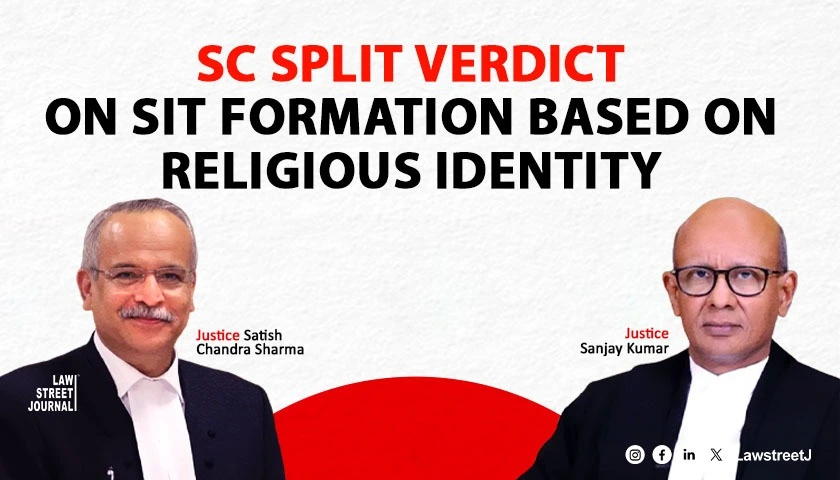New Delhi: In an interesting turn of events*,* the Supreme Court has passed a split order on a review petition filed by the State of Maharashtra challenging the Court’s earlier direction to constitute a Special Investigation Team (SIT) comprising senior police officers from both Hindu and Muslim communities to investigate a communal riots case.
Justice Sanjay Kumar dismissed the review petition, while Justice Satish Chandra Sharma issued notice to the respondent, resulting in a divided opinion.
The Court addressed Review Petition (Crl.) No. 447 of 2025 in Criminal Appeal No. 3976 of 2025 filed by the State of Maharashtra against Mohammad Afzal Mohammad Sharif, challenging an order dated September 11, 2025, wherein the Court had directed the constitution of a Special Investigation Team (SIT) comprising senior police officers from both Hindu and Muslim communities to investigate a communal riots case.
Justice Sanjay Kumar’s Order (Dismissing Review)
Justice Sanjay Kumar took a strong view of the procedural irregularity at the outset, noting, “The dubious and unprecedented practice of making separate mentions for seeking such hearing before both the Judges on the Bench simultaneously, without disclosing the fact that the other was also being approached, requires to be condemned in no uncertain terms.”
The State’s main contention was that directing the constitution of an SIT comprising officers from both Hindu and Muslim communities would impinge upon the principle of institutional secularism and amount to prejudging communal bias on the part of public servants.
Justice Sanjay Kumar rejected this argument, observing, “This contention loses sight of the fact that this Court specifically noted that the question that arose in the appeal was as to what extent the police had discharged their task of being vigilant, prompt, and objective in enforcing and securing the mandate of the law without bias and subjectivity.”
Justice Kumar emphasized the failure of police machinery, stating, “The facts set out in the order clearly demonstrate that despite information being given as to the commission of a cognizable offence, neither the officers of the police station concerned nor the Superintendent of Police took necessary action by at least registering an FIR, clearly manifesting total dereliction of duty on their part.”
He also explained the rationale for the composition direction: “As the case related to communal riots involving Hindu and Muslim communities, and the hues of this case prima facie hinted at a religious bias, it was necessary to direct the constitution of an investigation team comprising senior police officers of both communities so as to maintain transparency and fairness in the investigation.”
While addressing the matter, he further referenced the Supreme Court’s observations in Balram Singh v. Union of India (2024 SCC OnLine SC 3433), noting that India has developed its own interpretation of secularism where the State neither supports any religion nor penalizes the profession or practice of any faith.
Justice Sanjay Kumar emphasized the practical reality: “The inescapable fact remains that such State machinery ultimately comprises members of different religions and communities. Therefore, transparency and fairness in their actions must be manifest in matters even remotely touching upon secularism and religious oppression.”
On the constitutional principle, Justice Kumar observed, “Secularism needs to be actuated in practice and reality, rather than be left on paper to be enshrined as a constitutional principle.”
He therefore concluded, “Constitution of an investigation team comprising members of the communities involved in the communal riot would go a long way in ensuring and safeguarding the transparency and fairness of the investigation to be carried out, and there is no impingement of any idealistic principle.”
Accordingly, he dismissed the review petition.
Justice Satish Chandra Sharma’s Order (Issuing Notice)
Justice Satish Chandra Sharma, however, took a different view, allowing the application for an open court hearing and finding merit in the State’s contentions requiring consideration.
He noted that various grounds raised in the review petition “certainly require consideration by this Court,” particularly the limited prayer seeking review of the direction requiring SIT composition based on religious identity.
The State’s grounds for review were that the direction “constitutes an error apparent on the face of the record” and “directly impinges upon the principle of institutional secularism, which has been repeatedly affirmed by this Hon’ble Court as a part of the Basic Structure of the Constitution.”
Justice Satish Chandra Sharma therefore held, “In the considered opinion of this Court, as review and recall have been sought of the judgment to the limited extent that ‘it directs or mandates the composition of the Special Investigation Team (SIT) on the basis of religious identity,’ the matter requires consideration.”
Accordingly, he issued notice to the respondents, returnable within two weeks, and directed listing of the matter thereafter.
Case Title: State of Maharashtra & Ors. v. Mohammad Afzal Mohammad Sharif











